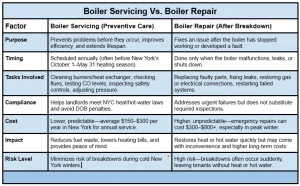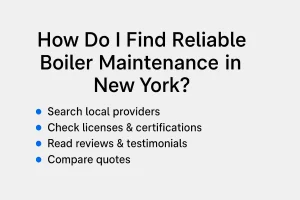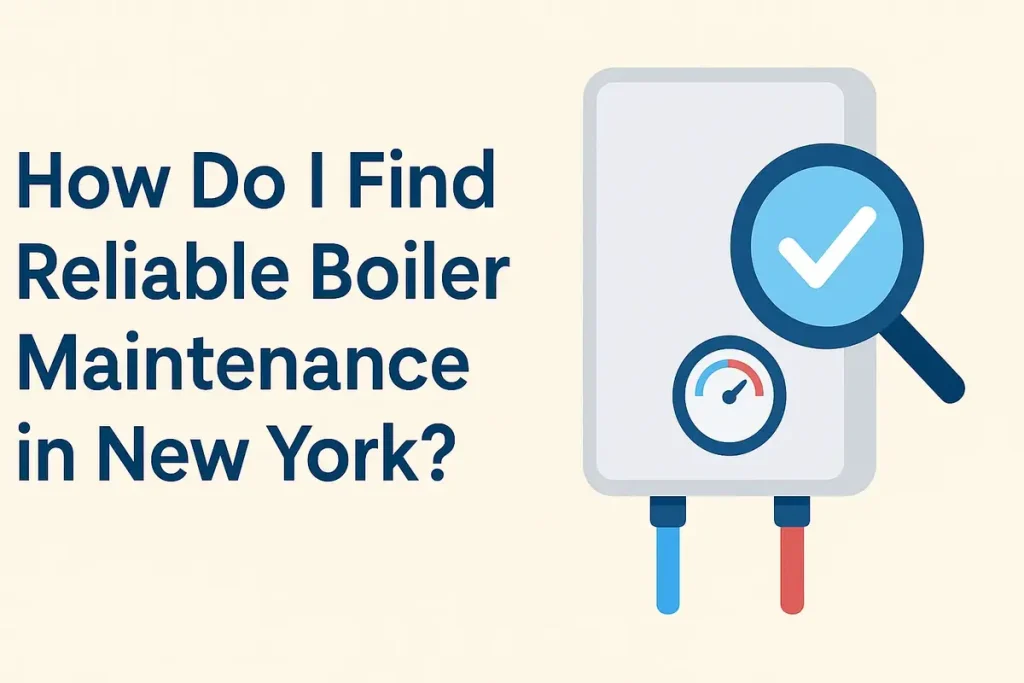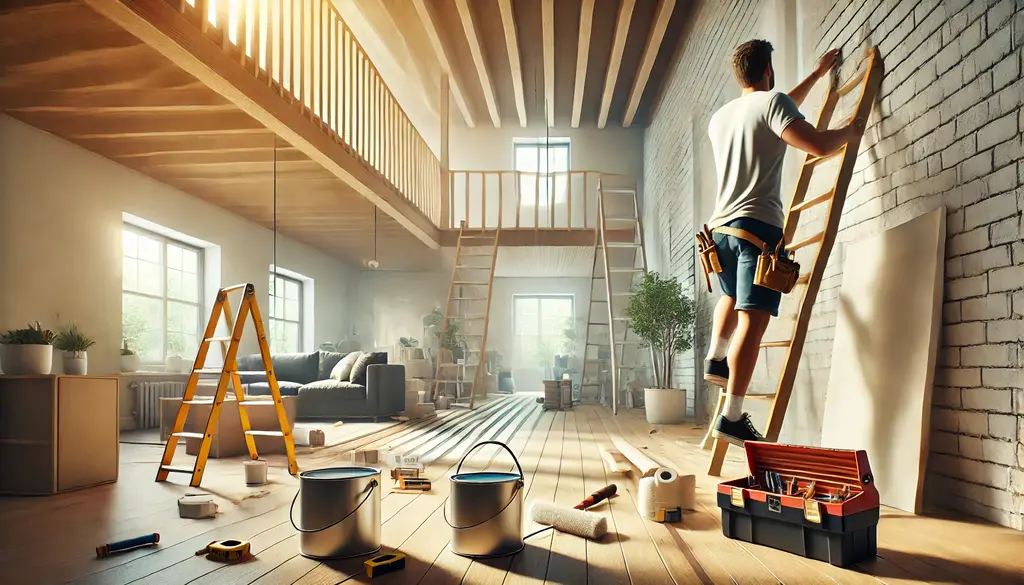Boiler servicing is a scheduled check-up that a licensed engineer performs to keep your heating system safe and efficient. A standard service covers cleaning, checking components and testing for leaks. It also ensures the system runs at the right pressure and temperature.
In New York, boiler servicing is more than routine checkup as it underpins legal heat and hot water requirements. Buildings must maintain 68∘F during the day when it is below 55∘F outside. The temperature must be 62∘F overnight from October 1 to May 31. Hot water must be kept at about 120∘F all year. The NYC Housing Preservation & Development (HPD) enforces these rules. Complaints are handled through 311.
During winter, boilers are used the most. The boiler breakdowns spike by nearly 30% during December and January. This often leaves households without heat during cold. In the U.S., the Department of Energy notes that heating is the largest energy expense for most homes. So, regular boiler servicing is crucial for comfort and controlling costs.
Let’s discuss boiler maintenance in details!
What Does Boiler Maintenance Involve?
Boiler maintenance is a combination of simple checks homeowners can safely do themselves and professional servicing tasks that require a certified technician. Doing this maintenance regularly keeps your system safe and efficient. It also makes it less likely to break down during the cold months.
Homeowner’s DIY Boiler Maintenance Tasks
You must leave major servicing to professionals. However, you can do a few things yourself. This keeps your boiler in good shape:
Check the Pressure
Boilers need the right pressure to run efficiently. This is usually between 1 and 1.5 bars. Use the gauge on the front panel to confirm this. You may need to add water through the filling loop if the pressure drops. But, if pressure keeps falling, it may signal a leak. A leak requires expert repair.
Bleed Radiators
Trapped air in radiators causes cold spots. It also causes uneven heating. Turn off the boiler first. Use a radiator key to release the air. Let the hot water circulate fully again. Put a container under the valve to catch drips. Recheck the boiler pressure afterward.
Look for Leaks
Regularly check the unit and surrounding pipes. Look for damp patches or drips. Even a small leak reduces efficiency. It can also cause damage if you ignore it. A professional should address any visible leaks immediately.
Monitor the Pilot Light
Make sure the pilot light burns a steady blue on older gas boilers. A flickering or yellow flame may signal gas supply issues. It could also mean a faulty component. Relighting is possible. However, repeated failures need a professional inspection.
Listen for Unusual Noises
Banging, whistling, or gurgling sounds often point to several problems. These include air in the system or limescale buildup. They can also mean low water pressure. Bleeding radiators or adjusting pressure may solve minor issues. However, a technician should check any persistent noises.
What Professionals Handle During Boiler Maintenance
Annual professional servicing is very important. It is critical for safety and efficiency. Here is what a trained HVAC or boiler engineer typically does:
Deep Cleaning of Components
Heat exchangers, burners, and internal parts collect dust and debris. Cleaning these areas prevents corrosion. It also improves efficiency. It ensures proper heat transfer.
Full Inspection and Testing
Technicians check the thermostat, seals, and valves. They check safety devices and electrical connections. Worn-out parts are found and replaced. This happens before they can cause a breakdown.
Flue and Ventilation Check
A blocked or corroded flue can be dangerous. It can prevent harmful gases from venting outdoors. Engineers ensure the system has proper airflow. They also confirm safe exhaust paths.
Carbon Monoxide Testing
Professionals test for leaks. They ensure the boiler is burning fuel correctly. This step protects households from dangerous carbon monoxide exposure.
Lubrication of Moving Parts
Components like pumps and fan bearings are lubricated. This reduces wear. It extends the system’s lifespan.
Efficiency Testing
Engineers measure how well the boiler converts fuel into heat. Adjustments are made if the efficiency is low. This is done to cut energy waste and lower bills.
Explore More: Winter Home Maintenance: How to Winterize Your Home
Boiler Servicing vs Boiler Repair: What’s the Difference?
When it comes to keeping your heating system reliable, many New Yorkers wonder about boiler servicing versus boiler repair. Although, the terms sound similar. However, they serve very different purposes. Boiler servicing is preventive. It focuses on keeping your system in peak condition and helps avoid failures. Boiler repair is reactive. It deals with problems after the system has already broken down. Understanding the difference helps homeowners and landlords to make smarter decisions. It helps them stay compliant with New York’s heating regulations and helps them avoid unnecessary costs.

Why Boiler Servicing Is Essential in New York Homes & Buildings
In New York, boiler servicing is not optional. It is critical for safety, cost control, reliability, and legal compliance. Cold winters push heating systems to their limits. Neglecting routine checks can lead to dangerous failures. It can also result in costly penalties.
Safety
Safety is the first and most important reason. A poorly maintained boiler can develop leaks. It can also have faulty combustion. This may allow carbon monoxide (CO) to build up. CO is odorless and invisible, but it is lethal. Hundreds of Americans die each year from accidental CO poisoning. Thousands more visit emergency rooms. Servicing ensures that burners, vents, and flues work correctly.
Energy Efficiency
Next is energy efficiency. New York’s heating costs are some of the highest in the nation. Scale buildup, soot, and worn components reduce a boiler’s performance over time. Proper servicing helps restore efficiency. This includes cleaning heat exchangers and tuning the fuel-air mix. It also involves fixing leaks in the system. This can reduce fuel bills by 10% or more. HVAC professionals report these savings estimates. Some service providers in the New York region report similar savings.
Legal Compliance
Legal compliance is just as important. Building owners must follow NYC’s Heat & Hot Water laws. They must maintain indoor temperatures of 68∘F during the day. This is required when outdoor temperatures drop below 55∘F. They must maintain 62∘F overnight. This period runs between October 1 and May 31. Hot water must run at 120∘F all year. If a boiler fails during the heat season, landlords risk 311 complaints. They also face violations and fines. HPD heat complaints routinely number in the hundreds of thousands every season.
Reliability
Finally, reliability during New York’s winters is crucial. A breakdown in sub-freezing weather endangers occupant health. It interrupts daily life. It often triggers expensive emergency repairs. Regular servicing helps prevent sudden failures. This is important when systems are already under heavy load.
Investing in scheduled boiler servicing is the most effective way to manage your system. This applies to any New York homeowner or building manager. It helps you stay safe and stay legal. It also keeps heating costs under control.
Read about: Chimney Cleaning in California: Cost, Tools, and Professional Services You Can Book Today
Common Boiler Issues in New York Homes
New York’s winter climate is often harsh. Boilers in residential and multi-story buildings are subjected to stress. These stresses reveal their weaknesses. Here are some of the most frequent problems.
Frozen Pipes & Valves
Extreme cold can cause water to freeze. This happens in exposed pipes or boiler feed lines. The frozen water then expands. This risks cracks or bursts in the piping. New York City’s Department of Environmental Protection gives a warning. Homeowners must insulate and protect exposed service lines. This prevents freezing and its damaging effects.
Sediment Buildup from Aging Water Mains
Many NYC buildings get water through old pipes. These pipes are often made of iron or steel. That water carries mineral particles and rust. This settles as sediment in boilers and heat exchangers. Over time, this “scale” reduces heat transfer efficiency. It causes overheating. It can even turn into a fire hazard.
Uneven Heating in Multi-Story Buildings
Boilers that serve many floors often struggle. They have difficulty balancing heat distribution. Older piping layouts can cause problems. Pressure loss or blocked zone valves can also lead to issues. This causes the upper floors to feel cold. Lower levels run too hot. This imbalance stresses the system. It leads to calls for boiler repair near me.
Pilot Light and Thermostat Failures
The pilot light or ignition system can fail in gas boilers. This happens due to burner grime or sensor issues. It can also be caused by a weak gas supply. In electrically controlled systems, thermostats may malfunction. Wiring faults may also occur. These problems may prevent the boiler from running when needed.
How to Find Reliable Boiler Service Near Me in New York
Finding a trustworthy boiler contractor in New York takes more than a quick Google search especially in dense metro areas like Manhattan, Brooklyn, Queens, the Bronx, and Long Island. The difference between a qualified technician and an unlicensed “handyman” can mean code violations or unsafe outcomes. Use these five steps to choose a reliable service. This will help you avoid bad experiences.

Step 1: Search Local Providers
Start with queries like “boiler service near me in New York and NYC boiler contractors.” Use Google Maps, Yelp, or local directories. Find providers that serve your ZIP code or borough. Focus on listings with business addresses. Look for multiple verified reviews, too.
Step 2: Check Licenses & Certifications
In New York City, licensed professionals must perform boiler service like Master Plumbers or Licensed Oil Burner Installers (LOBI). Only these licensees or their supervised employees can pull boiler work permits. A special license called High-Pressure Boiler Operating Engineer License is legally required for high-pressure boilers. It is needed to supervise operations. Make sure contractors show you their license number. Check for valid permit registration before they start work.
Step 3: Read Reviews & Testimonials
Check review platforms for feedback. Use Google, Yelp, and BBB. Look for comments on reliability and punctuality. Check for post-service performance, consistent professionalism and transparency across multiple independent reviews.
Step 4: Compare Quotes (Ask for Itemized Costs)
Contact at least two to three contractors. Ask them for written, itemized estimates. A trustworthy provider will detail labor, parts, and material costs. Avoid flat-rate proposals and vague descriptions.
Step 5: Look for Emergency Boiler Repair Near Me (24/7 Availability)
New York has cold winters. Breakdowns can happen at any time. Select a contractor who offers 24/7 emergency service. This prevents you from being left freezing. This is needed if your system fails at night or on weekends.
By combining these steps, homeowners and building managers in New York can cut through noise and locate a reliable, licensed, and local boiler servicing provider
Boiler Maintenance Costs in New York
Boiler maintenance costs can vary. It depends on several factors like system size, fuel type, age, accessibility, and parts. A typical one-time annual service often costs $150 to $300 for a residential boiler in NYC or surrounding areas. It covers basic inspection, cleaning, and minor adjustments. In Brooklyn, some local providers advertise annual tune-ups for as low as $129. This price is part of maintenance or HVAC “Total Care” plans.
Full servicing is more expensive. It includes deeper cleaning, combustion adjustments, and parts replacement. This can reach $200 to $500 or more especially for larger or older systems. The average boiler service cost is about $$424. Typical ranges are between $190 and $659. This depends on the job’s complexity.
Service Contracts vs Pay-Per-Service
Many New York boiler service firms offer service contract plans which let clients pay a fixed annual fee. This fee covers scheduled maintenance visits. It also includes priority service calls. For example, Calray Boilers in NYC states something important. Signing a contract can lock your price for the season. It also guarantees a priority response during emergencies.
Contracts often include many benefits. These include regular inspections and cleaning. They offer parts discounts. They provide 24/7 priority repair access. Pay-per-service is different. It means you hire the technician only when you need it. This is good for one-time calls. However, it can be more expensive when issues arise unexpectedly
Preventive Service vs Emergency Repair
The main benefit of preventive boiler servicing is avoiding costly breakdowns. Emergency repairs in New York tend to be far more expensive. For instance, a typical repair call in the NYC area may range from $350 to $950 or more. The cost depends on the needed part and labor.
In commercial settings, repair costs can skyrocket even more. One provider lists NYC commercial boiler repairs. They run from $350 up to $5,000 or more. This depends on the severity of the issue.
Compare a $150 to $300 maintenance visit with a potential $500 to $1,000 or more emergency repair. The savings from regular servicing are clear especially during New York’s cold winters.
Watch this Video to Explore More about Boiler Maintenance
FAQs about Reliable Boiler Maintenance in New York
What Maintenance Does a Boiler Need?
A boiler needs both DIY checks and professional servicing. Homeowners can monitor the pressure, bleed the radiators, check for leaks and listen for unusual noises. A licensed NYC technician handles the professional work. They will clean burners and heat exchangers. They will inspect valves and seals, test carbon monoxide levels, and verify flues and ventilation. They will also tune the boiler’s efficiency.
What is Boiler Maintenance?
Boiler maintenance is the process of keeping your heating system in good shape, safe, efficient, and compliant with the law. Maintenance includes regular inspections. It involves cleaning and efficiency tests, safety checks, meeting legal obligations for heat and hot water, and filing annual boiler inspection reports with the Department of Buildings (DOB).
How Much Does Boiler Maintenance Cost in New York?
A one-time boiler servicing visit typically costs $150 to $300 in New York for residential systems. More thorough cleanings or older boilers may cost $200 to $500 or more. Many providers offer annual service contracts. These contracts cover scheduled visits and priority repairs. However, emergency boiler repairs can cost $350 to $950 or more. Commercial repairs can cost several thousand dollars.
How Often Should I Schedule Boiler Maintenance?
Experts recommend scheduling boiler maintenance annually. The ideal time is before New York’s heating season. This season begins on October 1. Multi-family or commercial buildings may need extra checks. These checks ensure reliability during peak cold periods. They also help meet DOB regulations.
Why is Boiler Maintenance Important?
Boiler maintenance is vital for three reasons. It is important for safety, efficiency, and legal compliance. It helps prevent dangerous carbon monoxide leaks and heating costs by saving up to 10% on fuel. It ensures systems don’t break down during freezing winters.





